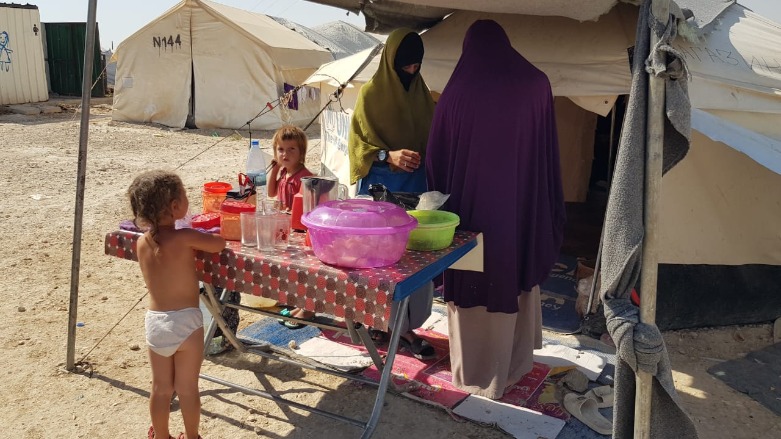Human Rights Watch urges countries to take back foreign ISIS women

ERBIL (Kurdistan 24) – The New York-based Human Rights Watch (HRW) on Tuesday urged countries to take back 11,000 foreign Islamic State women and children and to increase aid to camps where the women are held in the northeast of Syria.
The women and children are living in “appalling and sometimes deadly conditions in a locked desert camp in northeast Syria,” HRW said.
The al-Hol camp was initially built for 20,000, but now shelters over 72,000 people after the Islamic State was defeated in Baghouz by the US-backed Syrian Democratic Forces (SDF).
Inside the Al Hal camp, newly established call market called ‘Baghouz Bazaar’ with @vvanwilgenburg According to UN population of the camp is 70,285 pic.twitter.com/27JrOA0CnV
— Mutlu Civiroglu (@mutludc) July 9, 2019
Local authorities lack aid and support to deal with the large number of women and children who belonged to the terrorist organization.
“We feel abandoned by the international community,” Abdulkarim Omar, the administration’s co-chair for foreign affairs, told HRW.
“Taking care of these foreigners is a big, big problem for us. Countries should take back their people and rehabilitate them.”
Governments have been reluctant to take back foreign Islamic State fighters and women, fearing they could pose a security threat in their home countries, and lack evidence to prosecute the jihadists.
US president Donald Trump on July 16, however, said he was negotiating with European countries to take back their foreign fighters.
“We can’t be responsible for these people for 50 years or whatever it may be, or more,” he said.
The SDF have already made significant sacrifices as part of the international coalition fighting Islamic State, Omar said.
About 12,000 SDF troops were killed and another 20,000 were injured fighting the terror group, he said, in part “so that people in Europe can sleep calmly at night.”
While surveying the al-Hol camp, HRW found overflowing latrines, sewage trickling into tattered tents, and residents drinking wash water from tanks containing worms over three visits.
“Young children with skin rashes, emaciated limbs, and swollen bellies” sifted through mounds of stinking garbage under a scorching sun, or “lay limp on tent floors, their bodies dusted with dirt and flies.”
Children are also dying from acute diarrhea and flu-like infections, aid groups and camp managers said.
During a July 9 visit to the camp, foreign Islamic State women of various natonalities claimed there were merely victims and just wanted to return to their respective countries.
Victims of the Islamic State, however, such as the Yezidi minority that suffered at their hands, see this differently.
“We were just house wives,” one Dutch woman told Kurdistan 24 in al-Hol. “The only thing Holland and Belgium can do is to take us back.”
The women also denied they had opportunities to leave Islamic State-held territory earlier.
“People had to pay smugglers to get out, people with no money were not able to get out,” one woman said. “Until Baghouz, ISIS did not allow people to leave.”
According to Letta Tayler, senior terrorism and counterterrorism researcher at Human Rights Watch, “foreign women and children are indefinitely locked in a dustbowl inferno in northeast Syria while their home countries look the other way.”
HRW added that countries should immediately assist their citizens held in al-Hol camp to “come home if they choose to do so.”
“Governments should be doing what they can to protect their citizens, not abandon them to disease and death in a foreign desert,” Tayler added.
HRW also said that donor governments, the United Nations, and humanitarian agencies should also immediately increase aid contributions to all camp inhabitants, with more than 7,000 of them being children.
Editing by Nadia Riva
